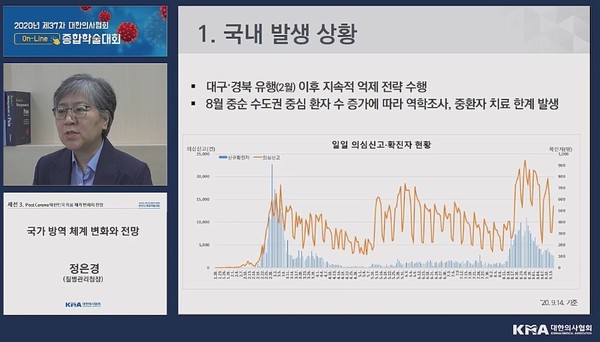Korea Disease Control and Prevention Agency (KDCA) Commissioner Jeong Eun-kyeong said she would integrate the nation’s infectious disease response system and enhance infectious disease research capabilities to fight Covid-19 and other new contagious diseases effectively.
The nation’s chief of the disease control agency spoke on how the KDCA will respond to the Covid-19 pandemic and how the nation’s disease control system will change at a conference, “Korean Healthcare and Disease Control Changed by Covid-19,” hosted by the Korean Medical Association (KMA) on Sunday.

“We’re trying to contain Covid-19, but community infections are accumulating. There can be a significant number of asymptomatic cases,” Jeong said. “Until treatment becomes available, we will try to combine response measures from the disease control agency, society, and the healthcare sector.”
As for the KDCA measures, the agency plans to reinforce its epidemiological investigation preemptive monitoring capability, she noted.
To prepare for a double outbreak of Covid-19 and influenza in the autumn season, the KDCA prepares measures for monitoring, diagnosis, patient care, and vaccinations.
According to Jeong, the nation will provide 5 million more free vaccinations for the elderly aged 62 years or older and people younger than 18 years old. In total, 19 million Koreans, including pregnant women, will get free flu shots this year.
The total flu vaccine supply is expected to be 29.5 million doses this year, up by 5 million from last year. The expected amount will cover 57 percent of the total population, she added.
Jeong admitted that many have questioned whether the criteria of the nation’s three-tier social distancing system were adequate or whether it was effective to put different levels of quarantine measures based on the facilities' types.
By evaluating the existing measures, the KDCA searched for sustainable social distancing rules that can help people balance between carrying out daily lives and keeping infection control in check, she said.
The agency also plans to provide legal grounds to force facilities to comply with disease control measures and complement measures to protect nursing homes and psychiatric institutions.
When it comes to Covid-19 response by the medical community, it is crucial to secure sickbeds for seriously ill patients and professional workforce, Jeong emphasized.
The agency also plans to expand community treatment facilities, introduce a self-treatment system there, operate a joint response system among regions, store personal protective gear and treatment facilities, and enhance medical institutions’ prevention and management of infections, she added.
The KDCA was making an effort to help develop a Covid-19 treatment and a vaccine, as well.
The agency was preparing for two scenarios to secure a Covid-19 treatment and a vaccine because the Covid-19 pandemic could prolong, Jeong explained. One is to develop them with government support in Korea, and the other is to secure a foreign treatment and a vaccine.
“We have secured an amount (of Covid-19 vaccines) that can cover 60 percent of the total population as the first stage, and we plan to introduce overseas vaccines in the second stage by looking at the safety, efficacy, and outbreak situation,” she said.
Jeong also explained how the KDCA, recently upgraded from the Korea Disease Control and Prevention Center (KCDC), will reinforce the national disease control and prevention system.
Jeong said that while experiencing the swine flu, Severe Acute Respiratory Syndrome (SARS), and Middle East Respiratory Syndrome (MERS), the nation has learned that an imported new infectious disease can spread quickly threaten national security with a great social and economic impact.
She vowed to keep strengthening the agency’s response to the public health crisis induced by new infectious diseases.
More specifically, the agency will evaluate risks by continuously analyzing information on new infectious diseases, building a diagnostic method for new pathogens in advance, and creating algorithms to diagnose unknown cause symptoms, Jeong said.
For medical response, the agency will support infectious disease-specializing hospitals and regionally-designated hospitals for infectious diseases and help them store diagnostic agents and treatments.
KDCA also needs to enhance epidemiological study capabilities and R&D of infectious diseases.
The KDCA headquarters are significantly short of epidemiologists, she said.
The agency needs to hire epidemiologists from cities and provinces, train them, and make them achieve on-site work fully, she went on to say.

